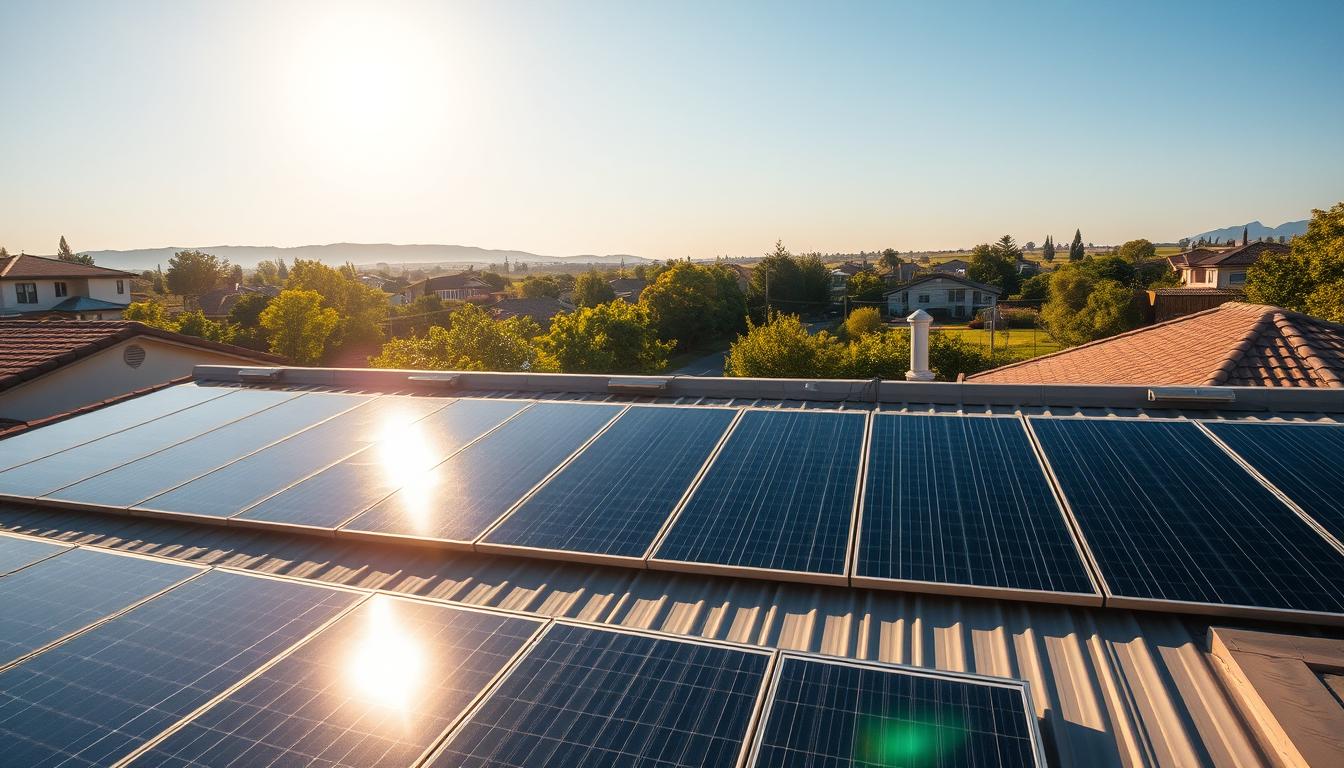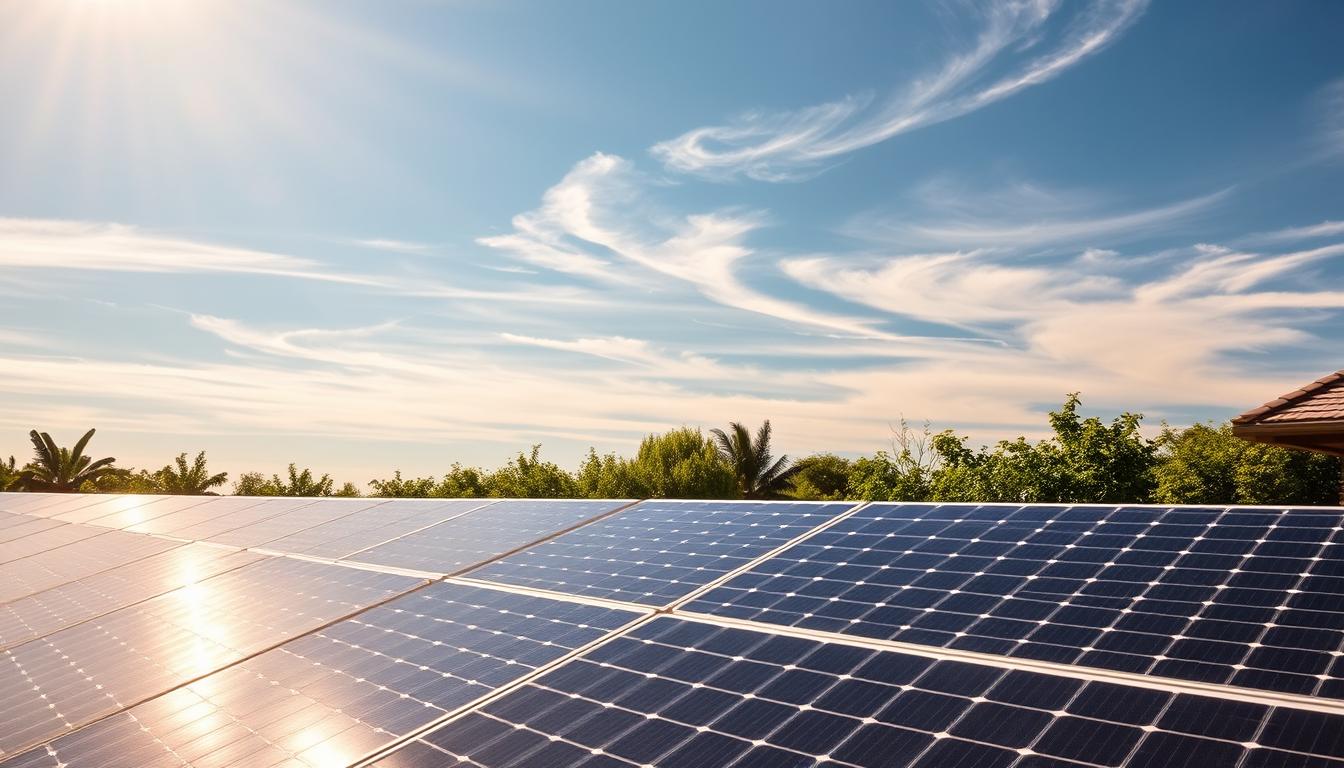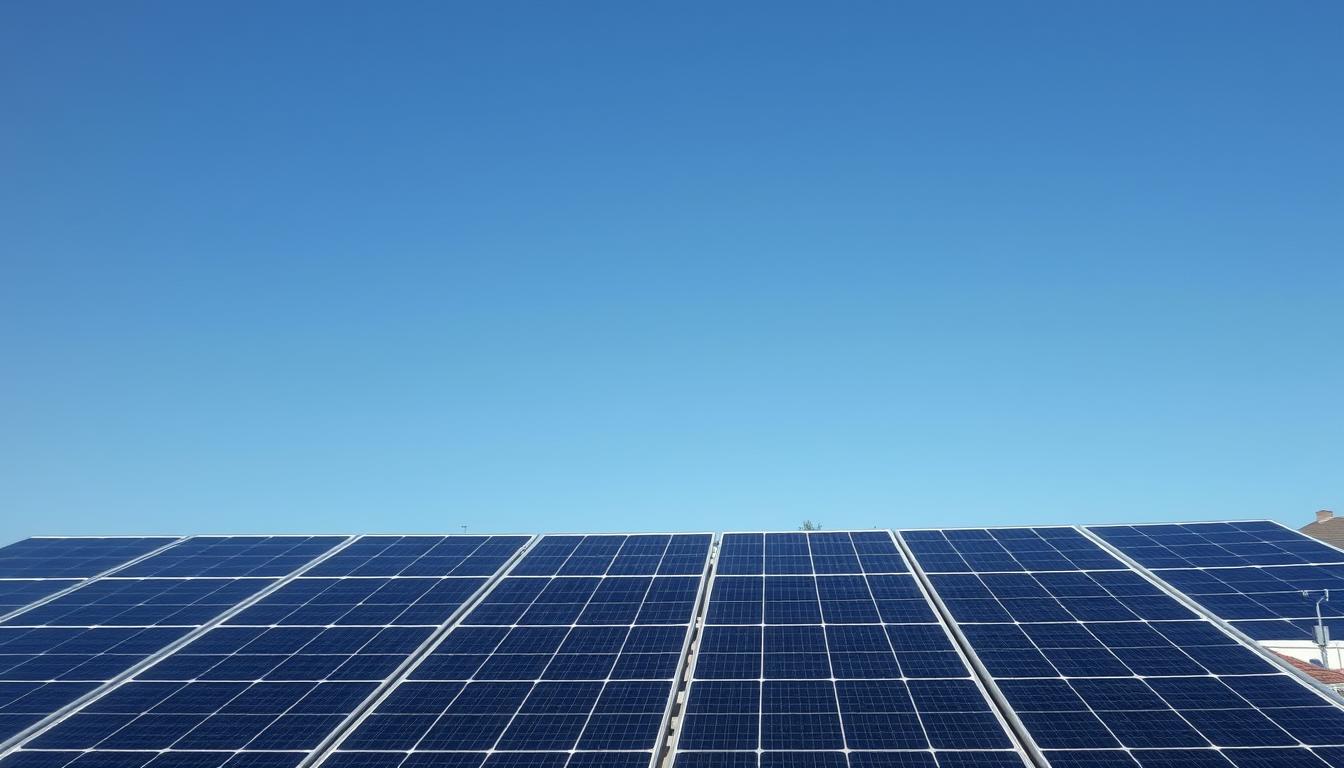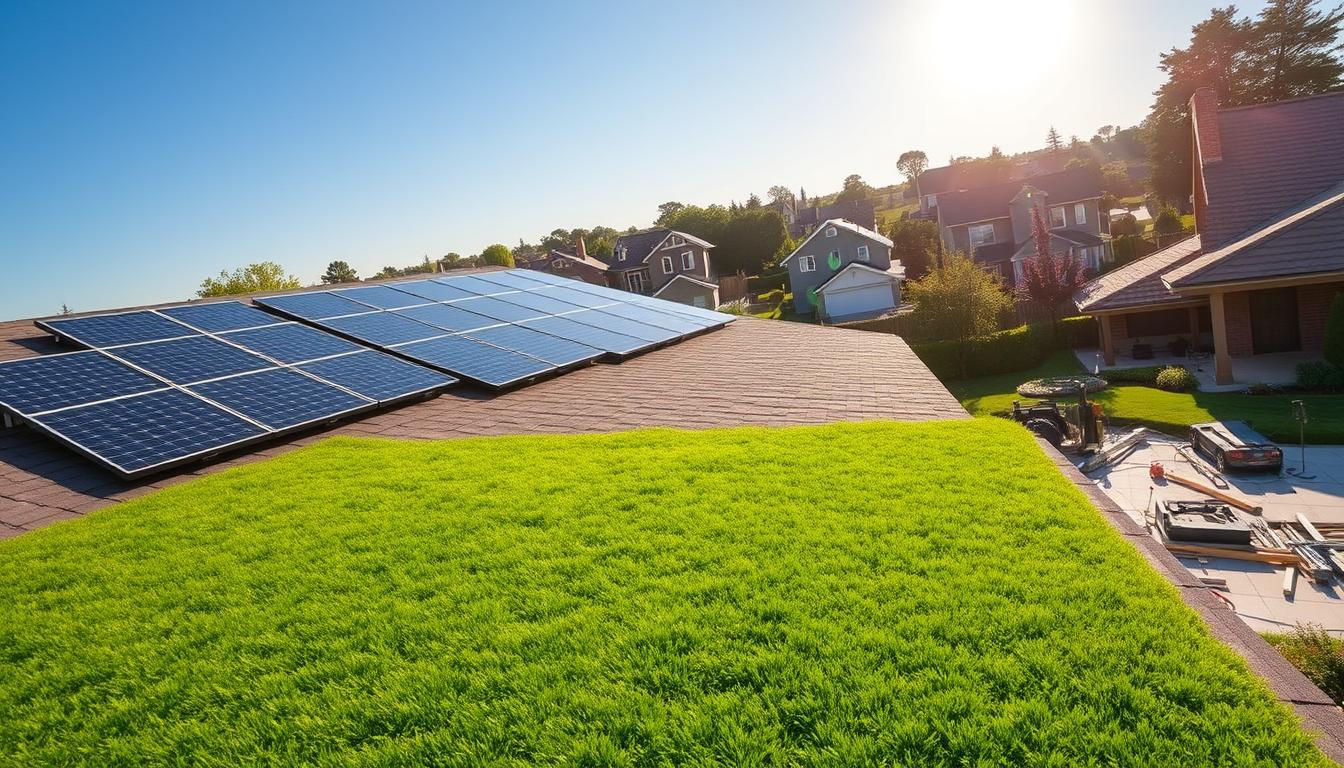Thinking about using solar energy for your home? You might wonder if it’s a smart choice. With over 300,000 solar panels installed in the U.S. alone, many homeowners have already made the switch. Solar panels can cut down your energy costs and reduce carbon emissions, making them a great choice for eco-friendly homes.
Residential solar power and home solar energy systems are gaining popularity. They provide a clean, sustainable way to power your home. It’s a move towards a greener future.
Exploring solar energy can be enlightening. Did you know the average system size is about 7.15 kilowatts? And solar costs have dropped every year from 2009? With solar power growing fast, now is a great time to join the renewable energy movement. This article will help you understand solar panels for your home and the benefits of residential solar power.
Key Takeaways
- Solar panels can help reduce your energy bill and carbon footprint
- Residential solar power and home solar energy systems are becoming increasingly popular
- The average solar energy system size is around 7.15 kilowatts1
- The cost of solar has decreased every year from 20091
- Solar power is one of the fastest growing alternative energy sources2
- Solar panels can be used to generate clean energy and contribute to a sustainable future
What Are Solar Panels and How Do They Work?
Solar panels turn sunlight into energy using special cells called photovoltaic cells3. They work by using sunlight to excite electrons, creating electricity. Knowing how they work is key for those thinking about getting solar panels, as it affects the cost.
Turning sunlight into energy is a complex process, but it’s simple to understand. Solar panels are made of photovoltaic cells that change sunlight into energy. They can be put on rooftops or in big solar farms4. Amazingly, the sun’s energy in just an hour and a half could power the whole world for a year4.
Solar panels also save money on energy bills. They help homeowners use less traditional energy, cutting down on costs. Even though solar panels might cost a lot at first, the long-term savings and government incentives make it worth it5.
Benefits of Installing Solar Panels for Your Home
Installing solar panels can save you money on energy bills and help the environment6. The best solar panels for your home can make clean energy. Plus, solar panel rebates and financing options can help with costs7.
Some key benefits of solar panels include:
- Lower energy bills: Solar energy can cut your bills by up to 50%7.
- Higher home value: Homes with solar panels can be worth up to $15,000 more7.
- Good for the environment: Solar energy is clean and reduces your carbon footprint6.
Solar panels also give you energy independence and help the planet. They last about 25 years7. To learn more, visit solarpathlights.org for home options.
Types of Solar Panels Available
When looking at solar panels for your home, knowing the types is key. There are three main types: monocrystalline, polycrystalline, and thin-film solar panels. Monocrystalline panels are made from one crystal of silicon. They are very efficient, with some reaching over 20% efficiency8.
Polycrystalline panels are made from many crystals. They are less efficient, with rates between 15-17%9. Thin-film panels are made from a thin layer of material. They are less efficient, but cheaper to make, with rates from 7-13%9.
Choosing the right solar panel depends on your budget, energy needs, and what you like. It’s important to know the good and bad of each type before deciding.
| Solar Panel Type | Efficiency Rate | Lifespan |
|---|---|---|
| Monocrystalline | 18-24% | 25-40 years |
| Polycrystalline | 13-16% | 25-30 years |
| Thin-Film | 7-13% | 10-20 years |
Understanding the different solar panels helps you choose the best one for your home. It should meet your energy needs and fit your budget.
Factors to Consider Before Installing Solar Panels
Before you install rooftop solar panels, check your home’s energy use. This will help you figure out the right size and type of system10. The shape and slope of your roof matter too, as they can change how well your panels work10. Also, the direction of your roof and how much sunlight it gets are key. South-facing roofs are best for energy production10.
Make sure your roof can handle the weight of solar panels to avoid damage10. Planning is also key to avoid water problems and ensure good drainage10. Knowing about local utility connections and prices for solar panels can guide your choices11.
- Roof orientation and angle
- Local climate and sunlight exposure
- Home energy needs and usage patterns
- Weight-bearing capacity of the roof
- Local utility grid connection processes
By looking at these factors, you can set up solar panels right. This way, you’ll get the most out of them and save on costs11.
The Installation Process of Solar Panels
Understanding the solar panel installation process is key to a successful setup. It starts with a free home evaluation and quote from a licensed contractor12. They will check if your roof is right for solar panels and figure out your energy needs.
The actual installation takes one to three days, depending on the setup’s complexity13. Steps include mounting panels, connecting electrical parts, and testing the system. The whole process, from start to finish, can take a month to three months12. After, the contractor checks the system to make sure it works right and safely.
When installing, consider your roof’s orientation and the local climate12. Panels work best facing south and tilted 15 to 40 degrees12. The cost is $2.50 to $3.50 per watt for homes in the U.S13. The federal Investment Tax Credit (ITC) can also save you 30% on costs12.
The solar panel installation process needs careful planning and execution. By thinking about roof orientation, climate, and energy needs, you can make the most of your system. With a skilled solar contractor, you can smoothly go through the process and start saving on energy bills14.
Financing Options For Solar Panel Installation
Thinking about solar panels can be pricey. But, there are ways to make it more affordable. You can buy the system, get a loan, or lease it. Plus, tax credits and incentives can lower the cost.
The average cost of solar panels in the U.S. is $31,55815. You can get a 30% tax credit under the Inflation Reduction Act15.
Some companies pay for the installation16. This makes it easier to go solar. DIY installation can also save money. Solar rebates can cut down the initial cost. Prices vary from $2.03 in Arizona to $3.56 in Wyoming16.
It’s key to understand each financing option. Look at interest rates, repayment terms, and your debt-to-income ratio. Home equity loans and HELOCs often have lower APRs than personal loans16. The right choice can lead to long-term savings on energy bills.

Common Myths About Solar Panels
Thinking about solar panels for your home? You might have heard some myths. One big one is that they cost too much. But, the price of solar energy has dropped a lot. Now, it’s under 4¢/kWh, which is very affordable17. In fact, it’s 150 times cheaper than it was in the 1970s17.
Another myth is that solar panels don’t work well. It’s true they’re not 100% efficient, with a rate of about 22%. But, technology has made them better18. Plus, they need very little upkeep. You should clean them once a year if you live in a dusty area18. Here are some common myths about solar panels debunked:
- Solar panels are too expensive: The cost of a residential solar system ranges from $15,000 to $35,00018.
- Solar panels are not efficient: Solar panels have an efficiency rate of approximately 22%18.
- Solar panels require a lot of maintenance: Solar panels generally require little ongoing maintenance18.
Residential solar power is a big deal. It can save you money and help the environment. Knowing the truth about solar panels helps you decide if they’re right for your home.
How to Choose the Right Solar Installer
Choosing the right solar installer for your home is key. Look for one that offers top solar panels, good rebates, and flexible financing19. Certifications from groups like the North American Board of Certified Energy Practitioners (NABCEP) are a must.
Start by asking about their experience and certifications. It’s best to pick installers with at least three years in the solar field19. Make sure they use subcontractors and check their credentials for quality work19. Also, choose installers who communicate well and explain warranties clearly19.
Here are some key factors to consider when choosing a solar installer:
- Certifications and experience
- Reputation and reviews from previous customers
- Quality of equipment and materials used
- Warranty and maintenance options
- Competitive pricing and financing options, including solar panel rebates and home solar panel financing20
By comparing different solar installers, you can find the best one for your home. This way, you can enjoy solar energy benefits, including the best solar panels20.

Don’t forget to check the installer’s ratings and reviews online. Also, look at their warranty and maintenance options20. With the right installer, you’ll get a quality solar system that meets your needs and offers a good return on investment. You’ll also get to use rebates and financing options19.
Maintenance and Lifespan of Solar Panels
Starting your journey with solar energy means understanding the upkeep and lifespan of your21 solar panels. Luckily, these systems need little care. Most makers offer warranties of22 25 to 40 years. This ensures your investment in21 residential solar power will last for many years.
Keeping your21 home solar energy system in top shape is simple. Just clean the panels and check for damage regularly. Over time, solar panels may lose some power, but not much. After22 25 years, they can keep producing22 82.5% to 87.5% of their original energy.
If your solar panels need more work, many makers have22 great warranties. These cover both the panels and the setup. This extra protection means you’re making a smart21 choice for your home’s energy needs. With the right care, your21 solar panels will keep giving you clean energy for years.
FAQ
What are solar panels and how do they work?
What are the benefits of installing solar panels for my home?
What types of solar panels are available for residential use?
What factors should I consider before installing solar panels?
How does the solar panel installation process work?
What financing options are available for solar panel installation?
What are some common myths about solar panels?
How do I choose the right solar installer for my home?
How do I maintain my solar panels and what is their expected lifespan?
Source Links
- Homeowner’s Guide to Going Solar – https://www.energy.gov/eere/solar/homeowners-guide-going-solar
- Solar Energy Made Easy | SmartEnergy – https://smartenergy.com/solar-energy-made-easy/
- How does solar power work? | Solar energy explained – https://www.nationalgrid.com/stories/energy-explained/how-does-solar-power-work
- How Does Solar Work? – https://www.energy.gov/eere/solar/how-does-solar-work
- What is Solar Energy & How Do Solar Panels Work? – https://us.sunpower.com/solar-resources/what-solar-energy-and-how-do-solar-panels-work
- 5 Benefits of Residential Solar – https://www.energy.gov/energysaver/articles/5-benefits-residential-solar
- The Advantages and Disadvantages of Solar Energy – https://www.constellation.com/energy-101/energy-innovation/solar-energy-pros-and-cons.html
- Comprehensive Guide to Solar Panel Types – https://aurorasolar.com/blog/solar-panel-types-guide/
- The 6 types of solar panels | What’s the best type? [2025] – https://www.sunsave.energy/solar-panels-advice/solar-technology/types
- 15 Things to Consider Before Installing Rooftop Solar Panels – https://www.electricchoice.com/blog/rooftop-solar-panels/
- 6 factors to consider when installing solar systems – https://green-living.na.panasonic.com/articles/6-factors-to-consider-when-installing-solar-systems
- How to Install Solar Panels – https://www.energysage.com/solar/solar-panel-installation-guide-what-should-you-expect/
- Solar Panel Installation: How to Install Solar Step by Step – https://unboundsolar.com/blog/step-by-step-diy-solar-installation?srsltid=AfmBOoqwmdzzvlTORKRxdVWwvSEpvcvyz3AOZGaVc5F8W3zLr2EFxxEJ
- The Solar Panel Installation Process – https://palmetto.com/solar/solar-panel-installation-process
- Financing Solar Panels: 2024 Guide to Loans and Rates | Bankrate – https://www.bankrate.com/homeownership/solar/solar-financing/
- What to Know About Solar Panel Financing – NerdWallet – https://www.nerdwallet.com/article/loans/personal-loans/solar-panel-financing
- Myths and Facts about Solar Energy – Center for Energy Education – https://center4ee.org/debunking-solar-myths/
- Busted: Common Solar Myths and Misconceptions – https://www.energy.gov/eere/solar/articles/busted-common-solar-myths-and-misconceptions
- Decisions, Decisions: Choosing a Solar Installer – https://www.energy.gov/eere/solar/articles/decisions-decisions-choosing-solar-installer
- How To Choose The Right Solar Company For Your Home – https://www.solarreviews.com/blog/how-to-choose-the-right-solar-company-for-your-home
- End-of-Life Management for Solar Photovoltaics – https://www.energy.gov/eere/solar/end-life-management-solar-photovoltaics
- How Long Do Solar Panels Last? Solar Panel Lifespan 101 – https://www.energysage.com/solar/how-long-do-solar-panels-last/




